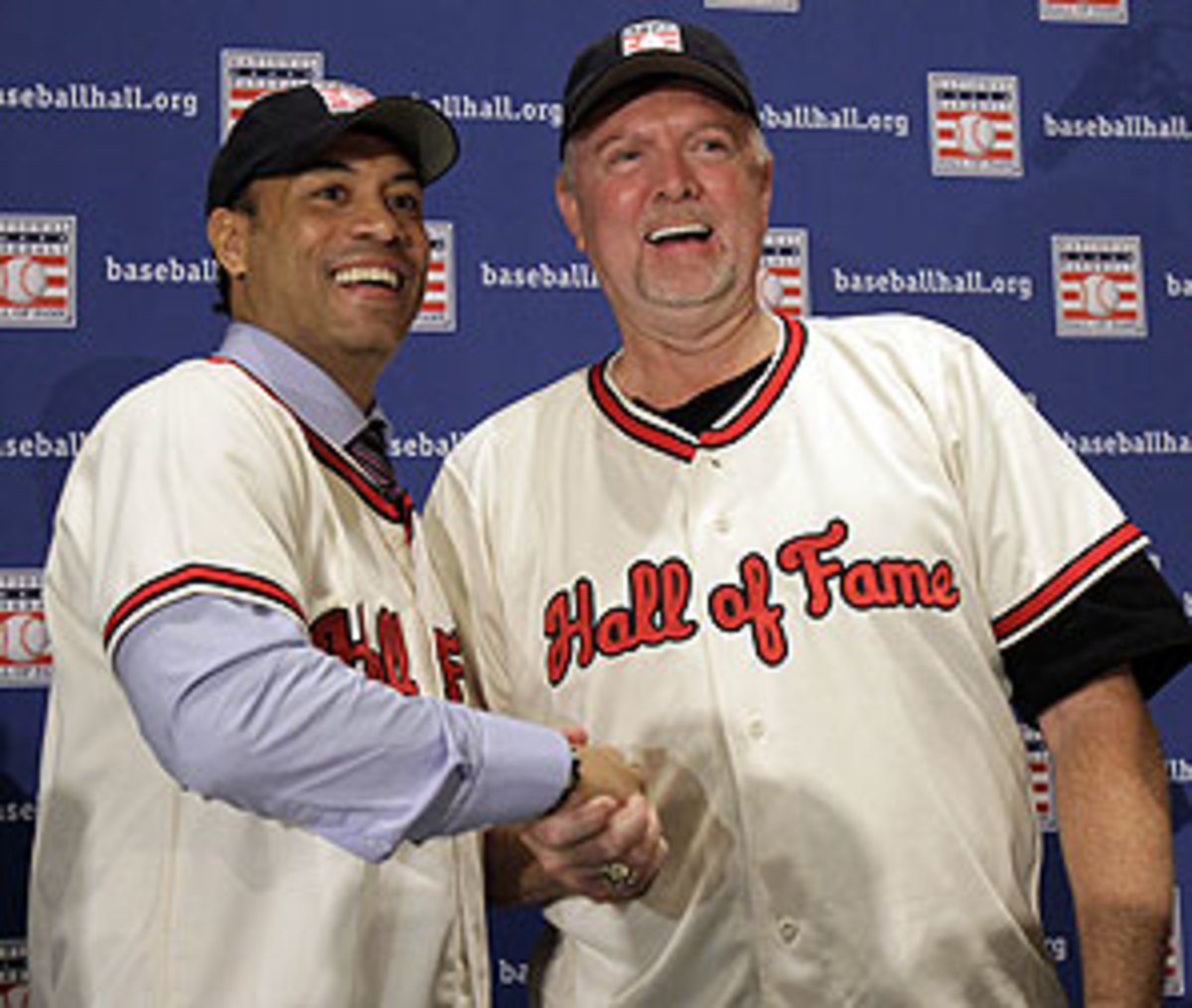
Blyleven, Alomar give Hall of Fame an international flavor
NEW YORK -- In introducing Bert Blyleven to the assembled media at the Waldorf-Astoria hotel Thursday morning, Baseball Hall of Fame president Jeff Idelson referred to him as "the first Dutchman" to be elected "but not the first to give a hot foot." The quip drew a laugh as Blyleven was known nearly as well for his off-field pranks as for his biting curveball and 287 career wins during his 22-year career.
Blyleven -- born Rik Aalbert Blyleven in Zeist, Netherlands -- is, in fact, the first Dutch-born Hall of Famer.
That piece of trivia will likely be included on his plaque but it was as notable in Idelson's comment for the way it set up the joke as for the historical significance of his accomplishment. After all, there have been only nine native sons of the Netherlands to ever play in the majors.
Blyleven's counterpart in the Baseball Writers Association of America-voted Hall of Fame Class of 2011, second baseman Roberto Alomar, is the third Puerto Rican-born player to be elected. His presence inspired a large contingent of Spanish-language writers to attend the press conference, and Alomar spoke of his orgullo, or pride, in representing his country.
VIDEO: For newest Hall of Famers, how sweet it is
Amidst his perfunctory introductions and thank yous, Idelson also noted that this was the first year that two Asian writers participated in the BBWAA ballot. After all, a writer needs to be a BBWAA member for 10 consecutive years to become part of the Hall constituency and Ichiro Suzuki, who came to the majors in 2001 and brought a large contingent of Japanese writers with him, just completed his 10th season in the majors.
The international flavor of this year's Hall election is no small footnote. Japan's pro league and the winter Caribbean leagues are flourishing; 27.7 percent of major-leaguers (231 of 833) on 2010 Opening Day rosters were born outside the U.S. and the two installments of the World Baseball Classic, in 2006 and 2009, have been successful in expanding the game's global reach. But while baseball has become increasingly global, the Hall of Fame has remained distinctly American.
In fact, prior to this year's election, only seven players born outside the 50 United States had been voted into the Hall on the writers' ballot. Two of those seven, Orlando Cepeda and Roberto Clemente, were, like Alomar, born in a U.S. territory (Puerto Rico) while only five were truly born in a foreign country: Tony Perez (Cuba), Luis Aparicio (Venezuela), Rod Carew (Panama), Juan Marichal (Dominican Republic) and Fergie Jenkins (Canada). Three other Cuban-born players were elected by the special Negro Leagues Committee, rather than on the BBWAA ballot.
While it is pure coincidence that Alomar and Blyleven will be enshrined together this July as they were barely contemporaries -- Alomar was elected on his second ballot, Blyleven on his 14th, and they only faced each other in one game -- they figure to be just the start of more international players joining the Hall. With so many talented players who were born outside the U.S. now active in the majors, the international flavor of Cooperstown is sure to grow within a decade.
But maybe not by as many as once thought.
Based purely on numbers, Rafael Palmeiro (Cuba), Juan Gonzalez (P.R.) and Larry Walker (Canada), who debuted this year, might have a case, as would 2013-eligible Sammy Sosa (D.R.), though the taint of performance-enhancing drugs (Palmeiro, Gonzalez and Sosa) and thin-aired Coors Field (Walker) will likely keep those four out. Among those still active, Manny Ramirez (D.R.), who was suspended by MLB for performance-enhancing drugs in 2009, and Miguel Tejada (D.R.), who was named in the Mitchell Report, have an uphill battle into the Hall.
Still, the influx of foreign-born stars should one day be represented in the Hall of Fame by Dominicans Pedro Martinez and Albert Pujols, not to mention Mariano Rivera (Panama), Ivan Rodriguez (P.R.) and Ichiro (Japan). Others, such as Venezuelans Miguel Cabrera, Johan Santana and Felix Hernandez are off to promising starts in their careers but have many years of consistent production to go. But it's a disproportionately small number given the talent out there.
For now, however, the Hall can celebrate Alomar and Blyleven. Alomar said he didn't know English when he reached the minor leagues and only knew how to say "one, two, three" when ordering value meals at Wendy's. But he is part of a baseball family, in which his father, Sandy, played and coached and his brother, Sandy Jr., was a six-time All-Star. Roberto Alomar spoke of how honored he was to join the company of fellow Puerto Ricans Clemente and Cepeda in the Hall.
"I know Puerto Rico is really blessed now to have three Puerto Ricans in the Hall of Fame," Alomar said. "Hopefully the young kids will see this as an inspiration and we'll get more kids playing baseball. Hopefully we can see more Puerto Rican kids coming to the big leagues."
After Alomar's impassioned remarks, a writer asked Blyleven what the reaction to his election had been in the Netherlands. "Which street?" quipped Blyleven. After all, the pitcher only lived there until he was two before moving to Canada for four years and then to southern California when he was six. Still, Blyleven embraced his diverse background.
"I've very honored to go in as a Minnesota Twin, also as a U.S. citizen and also being born in Holland," he said. "I'm very happy and proud be going in as a Dutchman."
The Hall of Fame is undoubtedly proud of these two players' diverse roots, but another sad complication of the Steroid Era is how it will limit the sport's international representation in Cooperstown.





